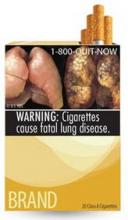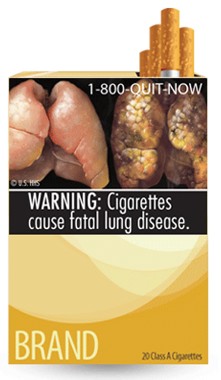User login
The Food and Drug Administration, facing virulent opposition from the tobacco industry as well as two court decisions that didn’t go its way, has decided to drop its proposals to include graphic, photo-based warning labels on cigarette packs.
Instead, the FDA said it will research new ways to craft warning labels that can reduce tobacco deaths, while still satisfying the courts’ requirements that any regulations not infringe upon tobacco companies’ First Amendment right to free speech. The 2009 Tobacco Control Act requires the FDA to implement new warning labels.
The graphic warning labels, first unveiled in 2011 and intended for placement on all cigarette packages, included disturbing photos such as the corpse of a man who died of tobacco-related causes, disease-riddled lungs, and rotting teeth. Other countries use similar warning labels.
A group of tobacco manufacturers sued the agency to overturn the requirement to use the labels, and two courts – most recently, the U.S. Court of Appeals for the D.C. Circuit – sided with the manufacturers. The Justice Department elected not to appeal the case to the U.S. Supreme Court.
The American Cancer Society Cancer Action Network, the ACS’ advocacy arm, urged the FDA to work quickly to develop new graphic warnings. "The current warning labels have not been changed in 25 years and are widely considered to be ineffective," group president Chris Hansen said in a statement. "Every day that the current warnings remain in place is another day in which ... the health of the nation is compromised."
The Food and Drug Administration, facing virulent opposition from the tobacco industry as well as two court decisions that didn’t go its way, has decided to drop its proposals to include graphic, photo-based warning labels on cigarette packs.
Instead, the FDA said it will research new ways to craft warning labels that can reduce tobacco deaths, while still satisfying the courts’ requirements that any regulations not infringe upon tobacco companies’ First Amendment right to free speech. The 2009 Tobacco Control Act requires the FDA to implement new warning labels.
The graphic warning labels, first unveiled in 2011 and intended for placement on all cigarette packages, included disturbing photos such as the corpse of a man who died of tobacco-related causes, disease-riddled lungs, and rotting teeth. Other countries use similar warning labels.
A group of tobacco manufacturers sued the agency to overturn the requirement to use the labels, and two courts – most recently, the U.S. Court of Appeals for the D.C. Circuit – sided with the manufacturers. The Justice Department elected not to appeal the case to the U.S. Supreme Court.
The American Cancer Society Cancer Action Network, the ACS’ advocacy arm, urged the FDA to work quickly to develop new graphic warnings. "The current warning labels have not been changed in 25 years and are widely considered to be ineffective," group president Chris Hansen said in a statement. "Every day that the current warnings remain in place is another day in which ... the health of the nation is compromised."
The Food and Drug Administration, facing virulent opposition from the tobacco industry as well as two court decisions that didn’t go its way, has decided to drop its proposals to include graphic, photo-based warning labels on cigarette packs.
Instead, the FDA said it will research new ways to craft warning labels that can reduce tobacco deaths, while still satisfying the courts’ requirements that any regulations not infringe upon tobacco companies’ First Amendment right to free speech. The 2009 Tobacco Control Act requires the FDA to implement new warning labels.
The graphic warning labels, first unveiled in 2011 and intended for placement on all cigarette packages, included disturbing photos such as the corpse of a man who died of tobacco-related causes, disease-riddled lungs, and rotting teeth. Other countries use similar warning labels.
A group of tobacco manufacturers sued the agency to overturn the requirement to use the labels, and two courts – most recently, the U.S. Court of Appeals for the D.C. Circuit – sided with the manufacturers. The Justice Department elected not to appeal the case to the U.S. Supreme Court.
The American Cancer Society Cancer Action Network, the ACS’ advocacy arm, urged the FDA to work quickly to develop new graphic warnings. "The current warning labels have not been changed in 25 years and are widely considered to be ineffective," group president Chris Hansen said in a statement. "Every day that the current warnings remain in place is another day in which ... the health of the nation is compromised."

